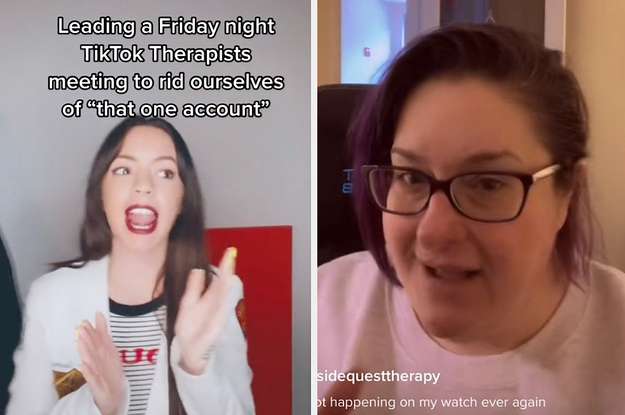Therapist Ilene Glance was trying to be “cute” when she posted a video to TikTok with the words “when a client wants to trauma dump first session” on Oct. 19.
She went back to her afternoon sessions, and by the time she checked her phone that night, thousands of people were furious at the “trauma dumping therapist.”
“is it ‘trauma dumping’ if you’re literally their therapist? if my therapist told me not to ‘trauma dump’ on them i would start making my tapes,” @diligenda said in a tweet featuring a screenshot of the video.
“I have an MSW [master’s of Social Work] and it is impossible to ‘trauma dump’ on your THERAPIST. Even in relationships with laypeople, ‘talking about your trauma a bunch’ is not even what ‘trauma dumping’ MEANS,” @Respexy said in another Twitter reaction.
“ah ok *adds ‘my therapist is making fun of me online’ to my grand list of anxieties,*” posted @antitractionist.
The outrage increased after people realized that Glance provided counseling to Marjory Stoneman Douglas High School students following the 2018 mass shooting in Parkland, Florida, which BuzzFeed News confirmed.
Glance, who works with clients aged 14 to 25 and specializes in trauma treatment, said her video had been misinterpreted.
She’d used the viral “Holy spirit, activate! Holy spirit, activate” soundbite — for people jokingly in search of backup from higher powers — and posted with the caption “Not on my watch.”
People were furious at the implied message that clients on Glance’s “watch” cannot share their most emotional experiences with her, their therapist.
“What’s with the caption, Ilene? What’s never happening on your ‘watch’ again?” said a therapist who posts as @thatpsychnp in a TikTok response. “You’re not going to let trauma victims share their story with you, their therapist? … You are dangerous to your patients and dangerous to the mental health field.”
Glance said that she wanted to use the colloquial phrase “trauma dump” to shed light on therapy best practices, saying she was trying to point out that therapy is a process and that not everything has to be said in the first session.
“I want them to understand we’re going to go slowly,” she said.
Glance thought only her 200 followers, most of whom are fellow therapists, would see it. Now she’s struggling with going viral and being questioned about her ethics and work practice.
After the initial negative comments, she took the video down and made her TikTok private. She put up a second video saying she felt “bullied.” The second video amassed even more comments. She deleted her account, but screenshots of the trauma dumping video continued to circulate on social media.
A stranger called her work phone and used profanity. People shared her professional license number and resources to report Glance to the state. A Yelp page attached to an old address of her practice got disparaging reviews, as did an old Facebook page. Her relatives received social media messages. Someone mailed at least three vicious postcards to her home, she said.
She reported the unwanted attention to police, and a public information officer for Coconut Creek Police Department confirmed on Wednesday that law enforcement continue to regularly patrol in front of her home. The first week after she posted the video, she said, she had barely slept, wasn’t eating and her blood sugar had reached dangerous levels for a diabetic.
“I would really like to stop getting hurt,” Glance said. “I’m asking to stop having my life ruined.”
Fellow therapists who use TikTok note that while the backlash against Glance is extreme, her “trauma dumping” video was inappropriate and damaging.
W
hen Meredith Vitale, LMSW, first saw the recent viral video of a counselor complaining about a client “trauma dumping” on them (you can
hen Meredith Vitale, LMSW, first saw the recent viral video of a counselor complaining about a client “trauma dumping” on them (you can watch the full video here ), she says she was disgusted, but not surprised. “Unfortunately, there are a lot of people who treat their clients like this, and that’s why a lot of people are hesitant to seek out therapy,” says Vitale, who works with people who have suffered from severe trauma.
Despite a surge of people starting or returning to therapy during the pandemic, 47 percent of Americans surveyed still say they see going to therapy as a sign of weakness—which is why a video of a therapist shaming someone publicly after a session is partucularly problematic as it feeds that fear. But if you’re unfamiliar with the expression “trauma dumping” or just want to understand it better, Vitale unpacks the issue below.
Starting with: What is trauma dumping?
To put it simply, trauma dumping is unloading about a traumatic experience on an unsuspecting listener like a friend or family member, which is not to be mistaken with it’s more common cousin, emotional dumping (aka venting) about something that’s bothering you like a difficult co-worker or bad date.
Related Stories
When you bring up your trauma with a friend, relative, or acquaintance who isn’t prepared to deal with it, Vitale explains that “they may not know what to do with it, they may react in a way that may exacerbate somebody’s anger or pain or trauma.” But you know who is trained to handle you talking opening about trauma? Mental health professionals, which is exactly why you should not be worried that you’re oversharing or unloading on them during a session as the video insinuates. “By definition, mental health professionals are supposed to be able to handle trauma,” Vitale says.
What does trauma dumping look like?
In a therapy session, Vitale says trauma dumping can look like “focusing an entirety of a session on a very traumatic event, usually combined with intense emotion in the session, either crying or bursts of anger.” But keep in mind, the context of a therapy session is, by nature, the appropriate environment to discuss your trauma: “If you’re talking to a therapist or a mental health professional, then you shouldn’t have to ask permission [to unload] because that’s part of the job,” Vitale says.
Finding a therapist to work through your trauma
All that said, it is important to keep in mind that different therapists specialize in different areas when it comes to treating clients—like interpersonal relationships, family, or childhood trauma, for example—so finding a therapist that focuses on your particular area of concern can lead to better outcomes.
Keep in mind that it can take time to feel comfortable talking to a new therapist, especially about traumatic experiences. But trust your gut, and Vitale also offers some red flags to look out for in a new therapy session to ensure you’re dealing with a well-trained professional. Ask yourself:
- Is the therapist constantly interrupting me, or trying to finish my sentences? “The client should be doing most of the talking, not the therapist,” she says.
- Is the therapist quickly trying to put their agenda on me? “Make sure the therapist is not saying that they pretty much understand your whole life [immediately],” she adds.
- Is the therapist saying or doing anything that makes you feel uncomfortable? “If you notice that something is wrong, then recognize that,” she says.
But even if a therapist isn’t trained in trauma work, or isn’t sure how to handle it, they still shouldn’t completely shut you down, says Vitale. “They should use active listening and be empathetic,” she says.
What’s more, a therapist who isn’t trained to handle the things their clients are talking to them about should always make a referral “to make sure that you’re with a person who has the skills to help you through this,” Vitale adds.
So, ultimately, the best thing you can do is speak up and share what you feel comfortable talking about when you do, as it’s the quickest way to figure out if your therapist is a good fit.
Oh hi! You look like someone who loves free workouts, discounts for cutting-edge wellness brands, and exclusive Well+Good content. Sign up for Well+, our online community of wellness insiders, and unlock your rewards instantly.
Enter Email Address

FreshSplash via Getty Images
There should be no such thing as “trauma dumping” when you’re in therapy.
If you’re on the therapy side of TikTok, you may have seen a viral video posted by therapist Ilene Glance that drew so much backlash, she has since deleted her account, @sidequesttherapy.
Glance titled the clip “When a client wants to trauma dump first session” and captioned it “Not happening on my watch ever again.”
Advertisement
Not surprisingly, many other therapists (and people in general) posted their own videos in response, explaining how problematic and hurtful her message was and wondering why Glance would apparently disparage a client for talking about their traumatic experiences.
“Trauma dumping” is a buzzword on Twitter and a breakout term online, according to Google Trends. It describes “when a person, unprompted, shares or ‘dumps’ highly-personal, emotionally-charged, trauma-based information or a story on someone who is not a willing recipient,” said Kelly Kellerman, a licensed clinical social worker with Thriveworks in Michigan, who added: “It’s also referred to as oversharing.”
“This is different from venting about something that is bothering you, such as dating woes or a difficult boss,” said Billie Katz, a licensed clinical psychologist and assistant professor of psychiatry at Icahn School of Medicine at Mount Sinai.
“When we bring up traumas with someone who is not prepared or professionally trained, we risk that they may act or react in a way that further triggers the speaker and unknowingly reinforces the trauma they experienced,” Katz explained.
Advertisement
Sharing is important, though, because trauma is something we need other people’s support in handling. We can’t just slip it under the rug. So where’s the balance between healthy sharing and unhelpful sharing?
“Therapy is the one space where you do not have to censor your trauma.”
– Tasha Bailey, therapist
“It is a good thing to find people to share our trauma with because connection builds safety, which allows us to heal from that trauma,” said Tasha Bailey, a therapist and content creator who specializes in trauma. “However, it is important for both of you that the receiver is ready and willing to support you in that.”
With your therapist, it’s their job to listen when you talk about your trauma ― despite what may have been implied in the viral TikTok video. There really should be no such thing as “trauma dumping” in a therapy session.
“Therapy is the one space where you do not have to censor your trauma,” Bailey said. “Sometimes the therapist might need to help the client slow down the narrative so that the work can happen on a deeper level, but essentially all trauma is welcome to be spoken about. Therefore, trauma dumping does not exist in therapy.”
Advertisement
Don’t believe anyone who implies you should censor yourself in therapy.
What is especially concerning about Glance’s TikTok video is that a therapist’s apparent dismissiveness of a client’s trauma could deter many people who aren’t in therapy from getting necessary treatment. A study in Psychological Medicine found that stigma is a major reason why people avoid getting help.
“This is so unbelievably dangerous because individuals who experience traumatic events should be seeking out mental health professionals,” Katz said. “The viral TikTok video insinuates that this type of sharing in session is ‘wrong’ and ‘bad,’ which may lead some viewers to not disclose their traumas for fear of trauma dumping.”
According to a study in the European Journal of Psychotraumatology, traumatic life events are associated with suicidality, especially with men. Plus, trauma — especially when it’s unresolved — can lead to serious challenges such as eating disorders and self-harm.
“If a therapist doesn’t have the skills, training and supervision to handle receiving information from a client, they should not work with people who have experienced trauma,” Kellerman said. “It is upsetting to think that a therapist would say things that would turn people away from getting help or reinforce more shame and judgment because of what they experienced.”
It’s a double whammy. “Many trauma survivors take on caretaker roles in their normal lives, looking after other people in the way that they wish they had been looked after before or during their traumatic experience,” Bailey said. “This video could potentially trigger some clients to take on caretaker roles with their therapist, in fear of overloading them.”
Advertisement

Renata Angerami via Getty Images
If a therapist isn’t receptive to what you’re sharing and how you’re sharing it, then they might not be a good fit.
Here’s how to talk about trauma in therapy.
Sharing your trauma in therapy is undoubtedly a tough experience. You may worry about how your therapist will respond, think you’re babbling, or look for signs they’re judging you. But you don’t need to feel discouraged.
“Feelings aren’t always neat and clean; sometimes it’s a messy process,” Kellerman said. “None of us, not even therapists, have shared our feelings or experiences perfectly every single time.”
Your therapist may understand what you’re going through firsthand. “They receive regular supervision and many are in therapy themselves,” Bailey said. “Therefore, you do not need to look after your therapist. Instead, let them look after you.”
“If you don’t feel comfortable opening up ― yes, even dumping ― to your therapists, you’re not going to get what you need out of the process.”
Advertisement
Ensuring you’ve found the right therapist can help. If your therapist is making you feel like you’re oversharing, that’s a red flag, that they’re not the therapist for you. If you don’t feel comfortable opening up ― yes, even dumping ― to your therapists, you’re not going to get what you need out of the process. You can find trauma-informed therapists in your area on Psychology Today’s website.
“It is important to find the right ‘fit’ between patient and provider so that the patient feels comfortable entering into vulnerable conversations about their past experiences,” Katz said. “In fact, the patient should be doing the majority of the talking … In return, patients should know what they deserve from a therapist … openness, authenticity, empathy, praise, and ultimately, skills to work through the impacts of their experiences.”
A necessary part of getting better is sharing what you’re going through, trauma and all. “The more I can learn about my patients and their experiences, the better I am able to serve them and support them in reaching their goals,” Katz added.
Your therapist can provide tips on coping with the trauma in a specific, effective way. “A therapist can help you learn how to release and sometimes contain the emotions,” Kellerman said.
So rest assured, you’re free to go to therapy and “trauma dump” all you want — because trauma dumping in therapy sessions doesn’t actually exist. By sharing your experiences and feelings, you can truly heal and get the treatment you deserve.
Advertisement



